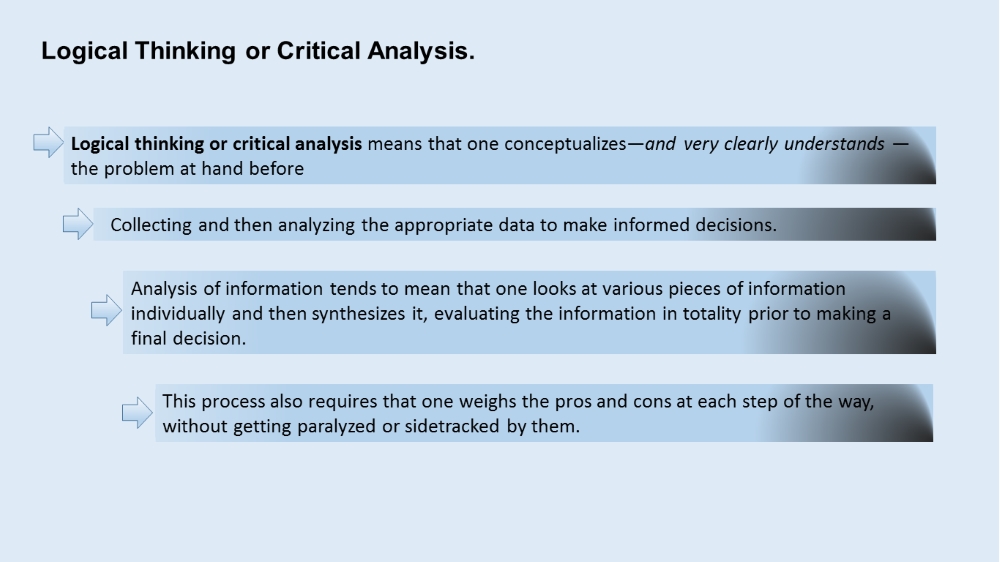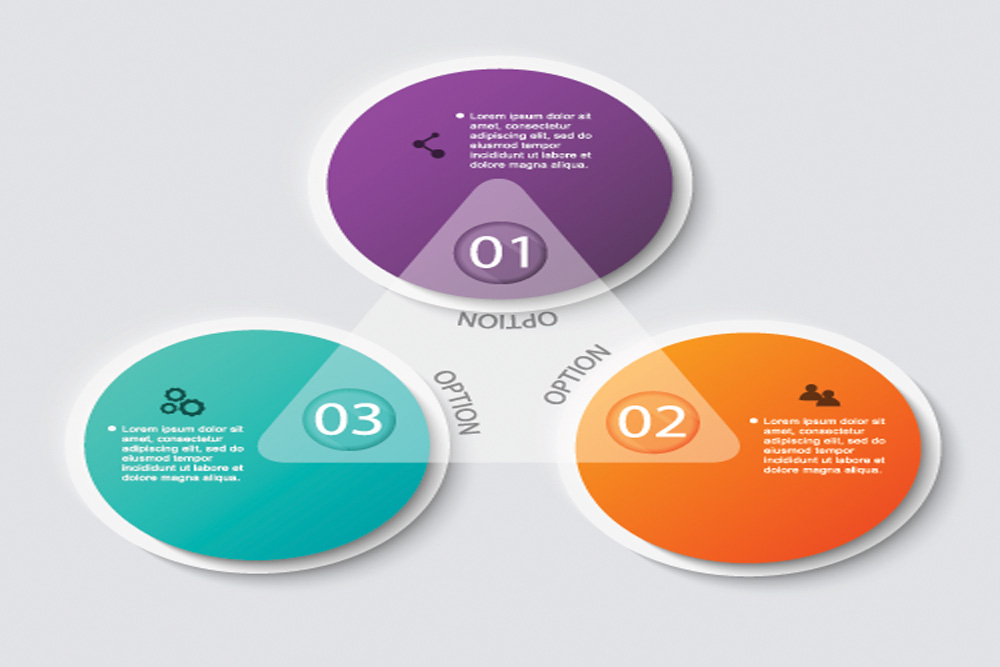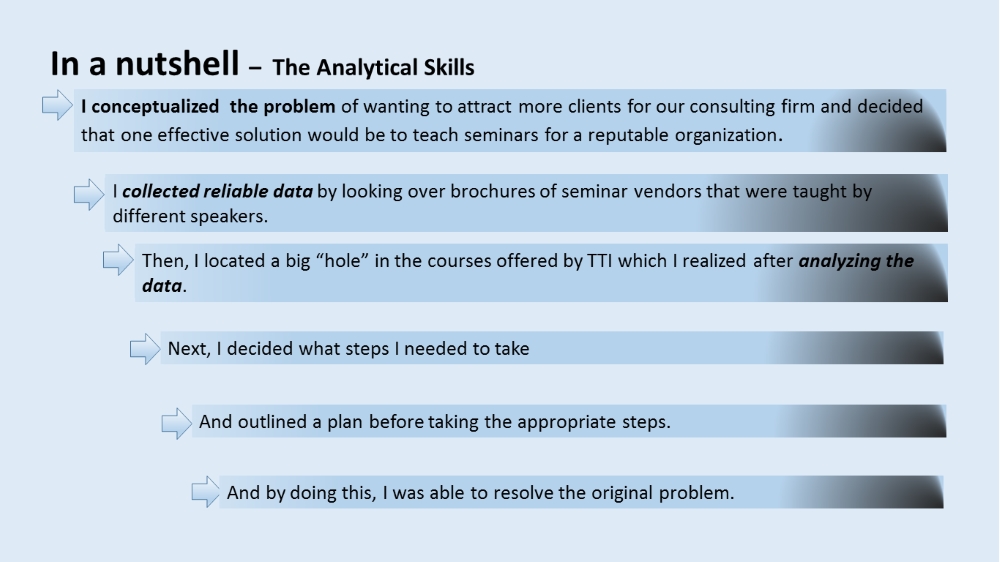In Taking Inventory of Your Skill Set – Part 1, we came up with a list of qualifications that are necessary in high-paying careers and jobs, such as:
- Communications Skills
- Analytical Skills (which I will be talking about in this blog post and in a few more)
- Computer/ Technical Capabilities (which I will be covering in future blog posts)
- Multitasking
- Interpersonal Communications Skills
- Manager/ Leader (which I will delve into more down the line)
- Sensitivity to Others’ Needs (we will cover this too in the future)
- Planning & Organizational Skills (I will write about these skills at length too)
That said, I plan to cover all of the above skills in our future blogs
In Taking Inventory of Your Skill Set: Part 2, we examined the “Middle-Skills Gap” and noted that it is important to begin working on our analytical skills. And that is what we will be talking about today.

According to Wikipedia, an analytical skill is the ability to visualize, articulate, conceptualize or solve both complex and uncomplicated problems by making decisions that are sensible given the available information. Such skills include demonstration of the ability to apply logical thinking to gathering and analyzing information, designing and testing solutions to problems and formulating plans.

Although there is no question that analytical skills are essential, other skills are equally required. For instance, in systems analysis, the systems analyst should focus on four sets of analytical skills: systems thinking, organizational knowledge, problem identification, and problem analysis/resolution. It also can describe how one identifies a problem and subsequently works out the solutions.
I would like to give you an example of how I used my analytical skills and got into public speaking as a seminar leader in my specialty of data for our consultancy, which made us a very good candidate for acquisition for our specialty of database technology.
I was looking for a nationwide venue to present seminars. Usually, the seminars feed consulting practice and vice versa. I had read about Dr. Kleinrock, an eminent professor of Computer Technology at UCLA. He was known for his major contributions to the Defense Advanced Research Projects Agency (DARPA). DARPA created networking technology, which is a major building block for the Internet. Dr. Kleinrock had started a seminar company called Technology Transfer Institute (TTI) while he was also teaching at UCLA. I looked at the TTI brochure of publicly available courseware and noted that they didn’t have a course in database design using relational concepts. That was the premise of my database design book. I called TTI and Dr. Kleinrock’s Director of Training answered the phone.
Me: “I just saw your TTI brochure and you don’t have any seminars on Database Design using Relational Concepts. I have written a very successful book which is accepted by Harvard, MIT, Stanford and Columbia as a textbook. Would you be interested?”
TTI: “Did you say Database Design with Relational Concepts?”
Me: “Yes. Exactly right.”
TTI: “Wait a minute.”
Dr. Kleinrock: “Hello, this is Kleinrock. Let me know the title of your book”
Me: “Data Base – Structured Techniques for Design, Performance and Management, published by John Wiley & Sons”.
Dr. Kleinrock: “Thanks. Please call me in two days.”
Me: “Thanks, Dr. Kleinrock.”
I called after two days. Dr. Kleinrock got on the phone and said, “Could you visit me at UCLA?” I took a trip to Los Angeles paying the expenses myself (as an entrepreneur one has to wisely spend money to make money) and visited Dr. Kleinrock. I was hired and I taught for TTI for three years, crisscrossing across the US and Canada. Our photos (together with my associates who taught side by side with me) were on their brochures, which were printed by the thousands. That was an extensive marketing boost at no cost to us.
Let us take a second and look step-by-step at how this example showcased my problem solving analytical skills:
The Problem:
I had just started my consulting practice leaving IBM, after having worked for IBM in various capacities for close to 14 years. I was looking for a tool to increase our consulting practice without having to spend much money, as I didn’t have much money for marketing. I wanted to hire professionals to grow our practice with whatever money I could put together instead of spending it on marketing.

My Thought Process:
I knew I could speak in front of a group pretty well. I had just recently written a Database Design book, DATA BASE Structured Techniques for Design, Performance and Management, published by New York City-based and world-renowned publisher John Wiley & Sons. The book was selling extremely well and was also translated into multiple languages, including Russian and Spanish. The book covered how to design databases using relational concepts, which was a new technology at that time. I knew I could very effectively use my book and present the material covered in my book at the seminars.
Before I started my consultancy practice, I spoke at various nonprofit professional organizations such as DPMA (Data Processing Management Association) and ACM (The Association for Computing Machinery). I was teaching a graduate-level course at New York University for their Master’s Degree in Computer Science in database technology. I had taught at IBM’s prestigious Systems Research Institute for three years. I was the only female instructor who was very successful there. With all these credentials, I knew I could conduct not only nationwide but worldwide public seminars. I had also worked in the field designing databases as an IBM employee and as the head of our consultancy company for AT&T, New York Telephone, Metropolitan Life, Citibank and the Federal Reserve Bank of New York. These companies were household names in the tristate area. This showcased that I had practical experience, not just book smarts.
I also knew that if I were to present public seminars, I would be able to speak in front of audiences that included professionals that worked for banks, insurance companies, manufacturing companies and retailers. If they liked what I had to say, they might be inclined to give my consulting firm a call.
As a result of this analysis, I knew that my next step should be to find a prestigious organization that conducted public seminars, so I did research on a multitude of organizations. And before long, I realized that TTI might be the perfect fit, since their seminars were popular and the organization itself had an outstanding reputation.
I looked for the intellectual merchandise that they were not offering at the time (in this case, an area of database design that I was an expert on), prepared several seminar plans that my associates and I would potentially teach for them and picked up the phone.
This opportunity allowed me to travel to 37 countries (many repeatedly) to speak. I was joined by my professional associates in certain locales, but sometimes they were able to travel to and lecture by themselves. Their photos were published on thousands of brochures, which was very compelling to the individuals working at various organizations. I then was able to hire high-caliber professionals for our organization with ease.
Soon, my organization became a hot commodity. Of course, I was not running the company solo! With the help of my associates, we were able to elevate our firm to a “brand name”-level within the database technology industry. Every week, at least two or three magazines would print our analysis of the database industry. With our research, analysis and implementation of databases we became unstoppable. And guess who gave us a contract to design, develop and implement their databases? The FBI.

Please share what problems you have solved/resolved by utilizing your analytical skills. I know that your fellow readers (and myself!) would love to hear all about it.
Other Resources –
Leave a Reply